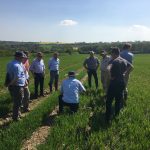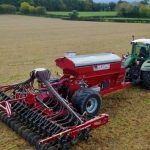Direct Drilling Key To Soil Health
Following extensive research into various methods of responsible soil management and crop cultivation the Duchy is encouraging tenants to consider direct drilling instead of traditional ploughing.
Direct drilling is a system of seed placement where soil is left undisturbed with crop residues on the surface from harvest until sowing. Seeds are delivered into a narrow slot created by discs, coulters or chisels. The benefits include improved soil structure and enhanced organic content, improved germination rates and increased numbers of invertebrates and earthworms within the soil.
A few of the Duchy’s tenant farmers have already invested in the technology required for direct drilling, believing it to be a more efficient and sustainable route to arable crop production.
Commenting on the findings, Duchy Head of Rural Christopher Sparrow said: “This is a direct result of the practical workshops we have been running for tenants to look at soil health and the impact of different cultivation methods on the land. We now have a much better understanding of the nature of the soils across our estates and the best ways to protect and improve their productivity. We hope that more of our tenant farmers will look at direct drilling and are exploring ways in which we might help them to introduce this and other farming methodologies which offer long-term environmental benefits as well as business efficiencies.”
The Duchy of Lancaster has been actively encouraging soil management for some time, first embarking on a data collection exercise to understand the different soils across the estates and then organising a series of practical workshops for tenants at the Game and Wildlife Conservation Trust’s model farm in Loddington. This programme of education, knowledge-sharing and practical experimentation will continue for the next couple of years with further workshops planned for 2020 and 2021.
Over 15 per cent of the Duchy’s total arable farmland is already using direct drilling and the target is to increase this to 75 per cent over the next three years.
“Direct drilling is not only environmentally beneficial and more sustainable, it also offers potential cost-savings over traditional plough-based systems,” added Christopher. “Once the initial investment has been made in the appropriate machinery, ongoing energy costs and the impact of soil damage, soil erosion, nitrogen leaching and agrochemical losses are much lower.”
Arable farmland accounts for 35 per cent of the Duchy’s rural estates in Cheshire, Lancashire, Lincolnshire, Northamptonshire, Staffordshire and Yorkshire.


